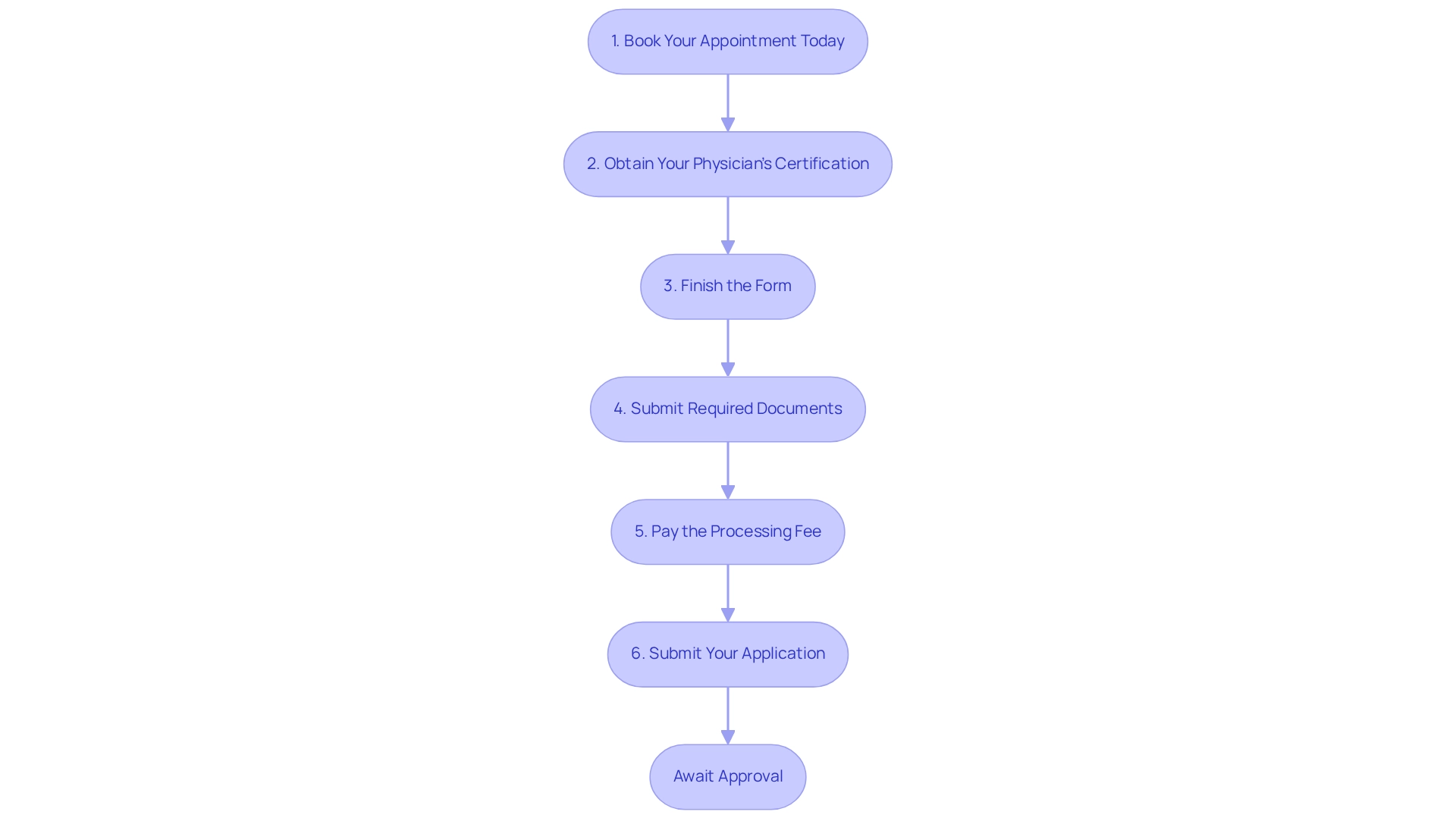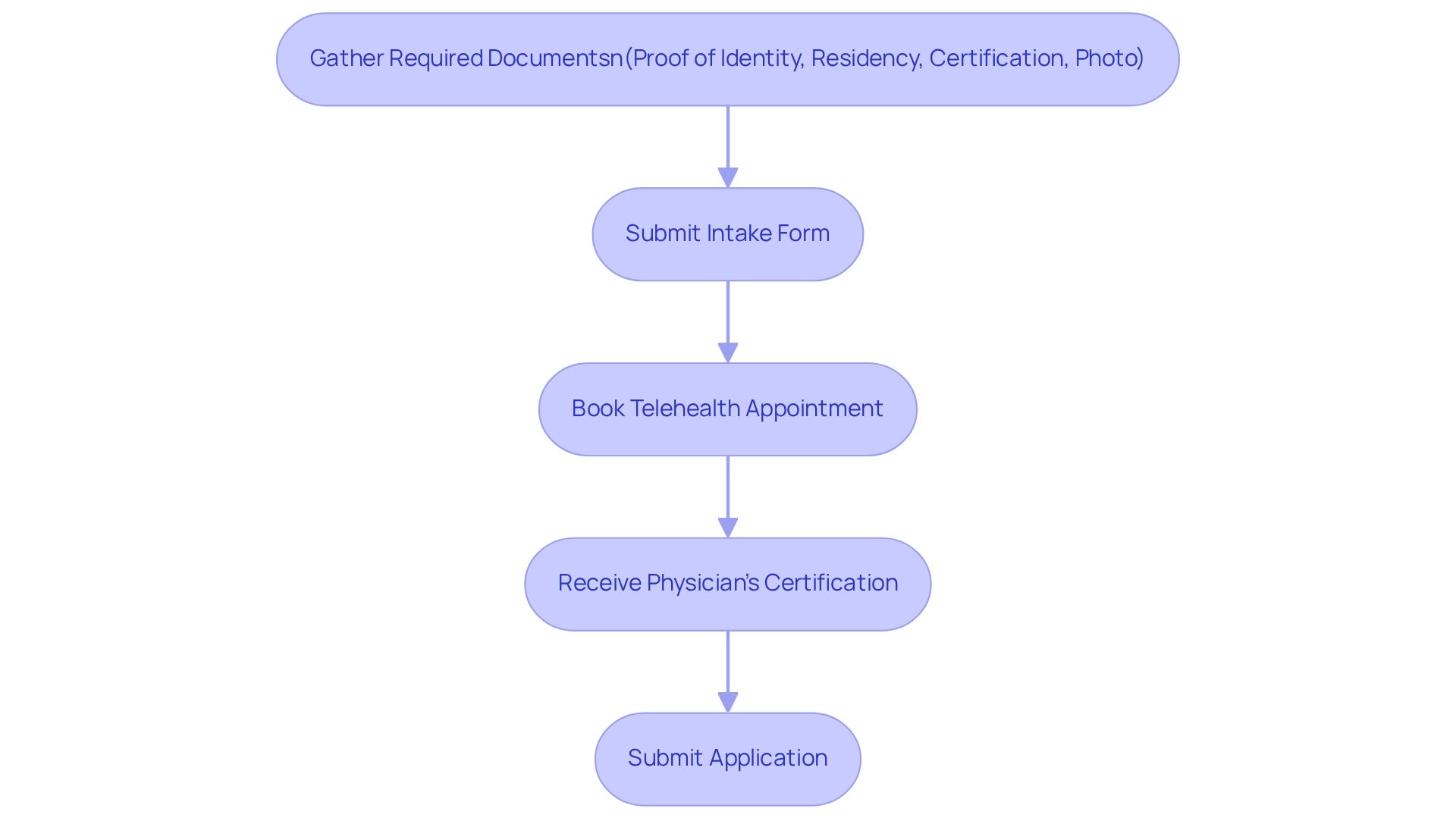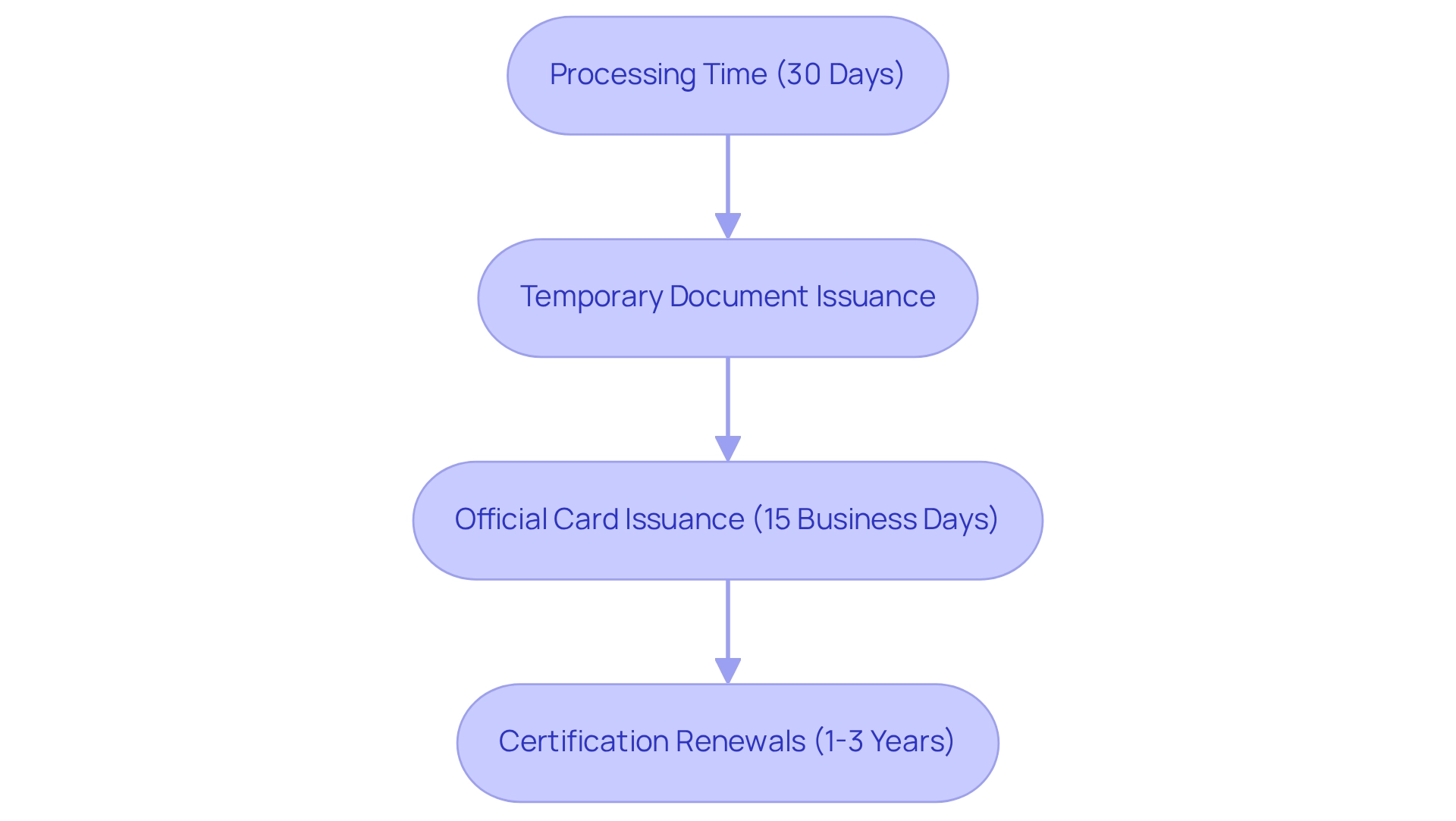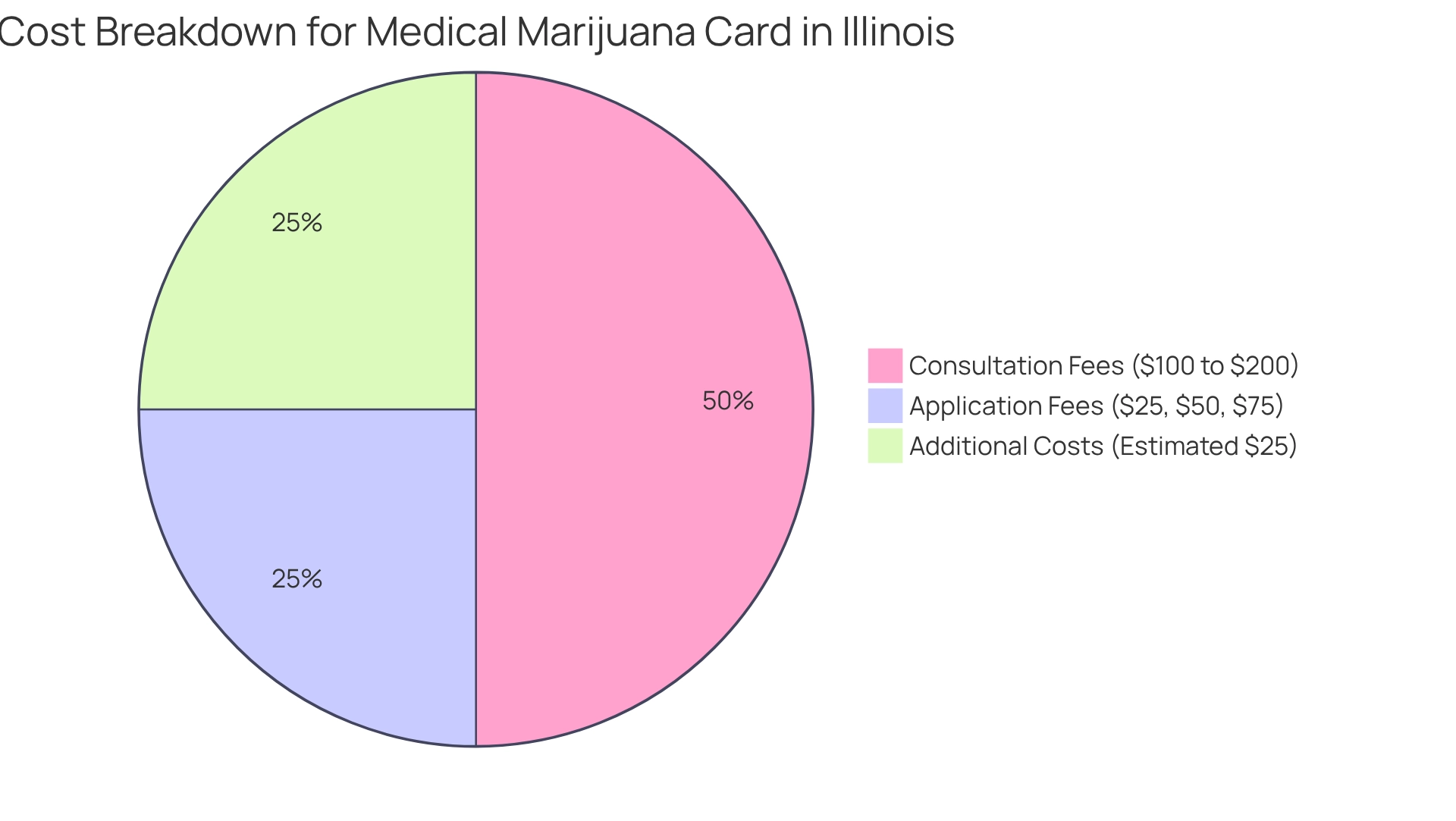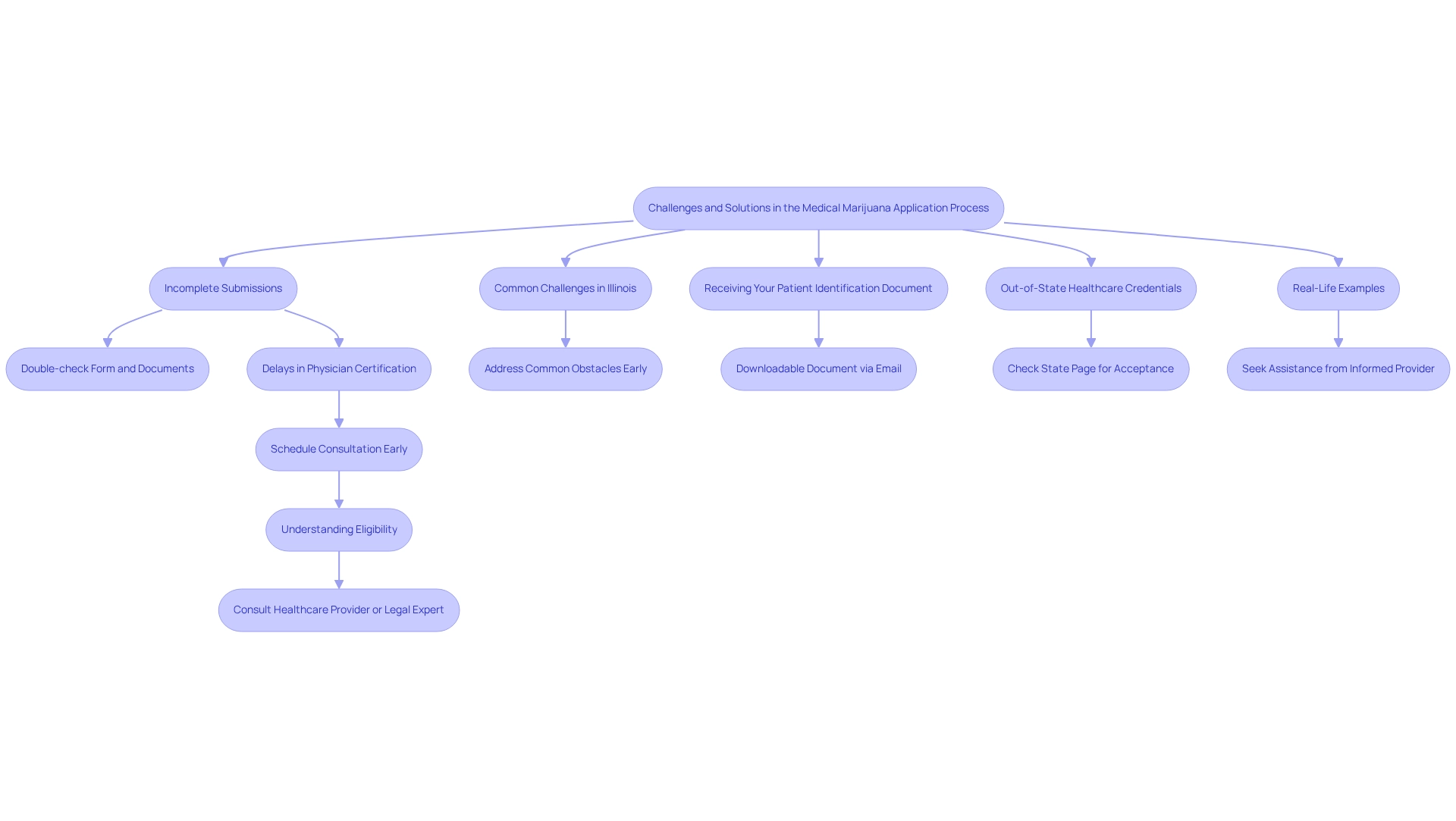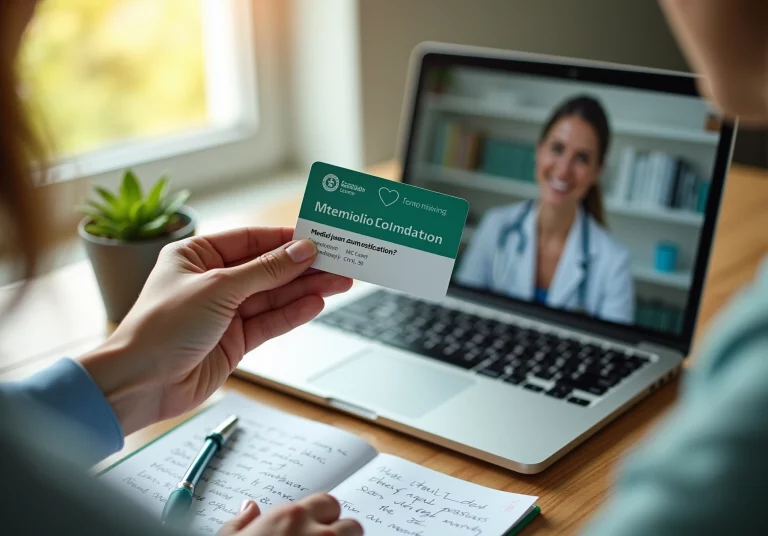How to Obtain a Free Medical Marijuanas Card in IL: A Step-by-Step Guide
by Maya Green · April 12, 2025
Learn how to secure a free medical marijuana card in Illinois with our comprehensive step-by-step guide.

Overview
If you’re looking to obtain a free medical marijuana card in Illinois, it’s important to know that the application process can feel overwhelming at times. However, by following a structured approach, you can find the support you need. This includes:
- Securing a physician’s certification
- Submitting necessary documents
- Paying applicable fees
You may find that utilizing telehealth services like Leafy DOC can make this journey much smoother. Many patients have successfully navigated the process and received approvals within just 24-48 hours. This means you can access the therapeutic cannabis you need in a timely manner.
It’s important to remember that you’re not alone in this process. With the right resources and support, you can take the necessary steps towards obtaining your medical marijuana card. We encourage you to explore these options and reach out for help when needed.
Introduction
In Illinois, the landscape of medical marijuana is shaped by evolving laws and an increasing recognition of its therapeutic benefits. With the Compassionate Use of Medical Cannabis Program Act leading the way, patients with qualifying conditions can now access cannabis through a streamlined process that emphasizes both legality and accessibility. However, it’s important to remember that navigating the intricacies of obtaining a medical marijuana card can be daunting. The complexities of state versus federal laws and the specific eligibility requirements may feel overwhelming at times.
As the cannabis industry continues to grow, understanding the legal framework and practical steps involved is essential for patients seeking relief. You may find that having the right information can make all the difference in your journey. This article delves into the essential aspects of medical marijuana legality in Illinois, guiding potential applicants through the eligibility criteria, application process, and the resources available to ensure a smooth journey toward accessing medical cannabis. Together, we can explore these important steps and empower you on your path to wellness.
Understanding Medical Marijuana Legality in Illinois
In Illinois, the Compassionate Use of Cannabis Program Act offers a vital legal framework for patients facing qualifying health challenges to obtain a free medical marijuana card. This card not only allows them to purchase cannabis from licensed dispensaries but also significantly improves their access to therapeutic options that can enhance their quality of life. However, it’s important to remember that while therapeutic cannabis is permitted at the state level, it remains illegal under federal law, which can understandably create confusion for patients trying to navigate their rights and responsibilities.
To avoid potential legal complications, patients are encouraged to familiarize themselves with the specific regulations governing the possession, use, and cultivation of cannabis. For instance, registered patients are allowed to possess up to 2.5 ounces of cannabis every 14 days, a guideline that underscores the importance of understanding the limits set forth by the state.
As we look ahead to 2025, the Compassionate Use of Cannabis Program continues to evolve, reflecting the growing acceptance and integration of cannabis into healthcare. The Illinois Department of Public Health oversees the Medical Cannabis Registry Program, which is essential for patients seeking a free medical marijuana card, ensuring both patient confidentiality and timely access to cannabis. This program has effectively provided registered patients with a free medical marijuana card while striving for efficient processing of requests and issuance of registry cards.
Recent statistics reveal that many requests are processed within 24-48 hours, highlighting the program’s commitment to expediting access for those in need. Leafy DOC exemplifies this dedication with its focus on fast approvals and comprehensive support, helping patients navigate the application process with ease. Leafy DOC also assists patients in understanding the qualifying conditions for a cannabis card, which include:
- AIDS/HIV
- Anxiety
- Arthritis
- Cancer
- Chronic pain
- Epilepsy
- Glaucoma
- Migraine
- Multiple sclerosis
- Nerve pain
- PTSD
Moreover, specialists emphasize the importance of legal clarity in the cannabis landscape, reinforcing the need for patients to stay informed about their rights under the Compassionate Use of Cannabis Program Act. As President Volodymyr Zelenskiy stated, “Cannabis legalization is a tool that can be used to support mental health,” underscoring the therapeutic potential of cannabis.
As the cannabis sector continues to expand, particularly in regions like Illinois, understanding these legal guidelines is crucial for patients aiming to navigate the complexities of acquiring a free medical marijuana card. Additionally, the job growth potential in the cannabis sector presents further opportunities for patients and the community, reflecting the evolving landscape of cannabis use and its implications. It is also essential to note that some states accept out-of-state health permits, while others do not, so patients should verify their state regulations accordingly.
Eligibility Requirements for a Medical Marijuana Card
To qualify for a free medical marijuana card in Illinois, it’s essential to understand the specific criteria set by state regulations. These requirements are designed to ensure that those in need can access the therapeutic benefits of cannabis safely and legally.
Age Requirement: First and foremost, applicants must be at least 18 years old. However, minors can apply if they have a designated caregiver who can assist them.
Residency: Proof of residency in Illinois is mandatory, as it helps ensure that the program serves local residents in need of care.
Qualifying Health Conditions: A licensed healthcare provider must certify that you have a qualifying health condition. Common conditions include chronic pain, PTSD, cancer, anxiety, epilepsy, and other debilitating ailments. It’s noteworthy that approximately 62% of individuals seeking marijuana licenses in Illinois cite chronic pain as their primary condition. Some examples of qualifying conditions for a medical cannabis card are:
- AIDS / HIV
- Anxiety
- Arthritis
- Cancer
- Chronic pain
- Epilepsy
- Glaucoma
- Migraine
- Multiple Sclerosis
- Nerve Pain
- PTSD
If you’re considering applying, it’s important to check whether your state accepts out-of-state medical cards, as regulations can vary.
Proof of Identity and Residency: Applicants must provide valid identification, such as a state ID or a utility bill, to verify both identity and residency.
Understanding these requirements is vital for prospective applicants to ensure they meet the necessary conditions before applying for a free medical marijuana card in Illinois. As we look ahead to 2025, the list of qualifying conditions remains consistent, reflecting ongoing advocacy for broader access to cannabis for health purposes. For instance, a recent study highlighted the challenges faced by patients with conditions like anxiety and chronic pain, emphasizing the need for improved federal oversight and integration of cannabis research into healthcare.
This is particularly relevant considering that as of February 2024, three states—Idaho, Kansas, and Nebraska—along with one territory, American Samoa, lack a legal cannabis program. This situation underscores the differing access to cannabis for health purposes across the country.
Real-world examples illustrate the diverse range of qualifying conditions. Many individuals experiencing persistent discomfort report significant improvements in their quality of life after acquiring their cannabis prescriptions. This aligns with findings indicating that the average number of comorbid conditions among cannabis users is 3.3 for males and 4.1 for females, highlighting the complex health profiles of many applicants.
Moreover, the standardization of data collection across states is necessary for transparency and to guide research and policy needs, as emphasized in recent discussions surrounding cannabis research.
In summary, the eligibility requirements for acquiring a free medical marijuana card in Illinois are thoughtfully designed to ensure that individuals with valid health needs can safely and legally access the therapeutic advantages of cannabis. As Rebecca L. Haffajee from the University of Michigan Department of Health Management and Policy notes, “The integration of cannabis research into the healthcare system is crucial for establishing evidence-based practices and improving patient outcomes.
Step-by-Step Application Process for a Medical Marijuana Card
The application procedure for acquiring a cannabis card in Illinois involves several crucial steps aimed at ensuring a seamless experience for patients, particularly through Leafy DOC’s telehealth services:
-
Book Your Appointment Today: Start by skipping the wait at the doctor’s office. Arrange your cannabis marijuana certification assessment from the comfort of your home. Simply submit an intake form with a few personal details and an ID. Leafy DOC will assist you in booking an on-demand telehealth appointment or scheduling a convenient time for later. Connect with the right doctor in minutes and easily chat with your provider via phone call or video on your smartphone, computer, or tablet.
-
Obtain Your Physician’s Certification: To obtain a free medical marijuanas card in Illinois, you need to have a Physician’s Certification, which will be issued after a licensed healthcare provider evaluates your medical condition during your telehealth appointment. This step is crucial, as the certification serves as the foundation for your application.
-
Finish the Form: Navigate to the Illinois Department of Public Health (IDPH) website to access the online form. It’s important to have all necessary information at hand to fill out the form accurately.
-
Submit Required Documents: Prepare to upload essential documents, including proof of identity (such as a driver’s license), proof of residency, and the physician’s certification. These documents are essential for verifying your eligibility for a free medical marijuanas card in Illinois.
-
Pay the Processing Fee: Be aware that processing fees differ based on the length of the document you are applying for: $25 for one year, $50 for two years, and $75 for three years. This fee is necessary to process your application.
-
Submit Your Application: Before submitting, carefully review all information for accuracy to avoid delays. Once verified, submit your request through the IDPH portal.
Await Approval: Following submission, you will obtain a temporary document while your request is being processed. Many requests are handled within 24-48 hours, permitting swift access to cannabis once authorized.
By carefully adhering to these steps, you will enhance your chances of a successful submission for a free medical marijuanas card in Illinois, ensuring you can access the therapeutic advantages of cannabis promptly. With Leafy DOC, you can connect with licensed physicians across the U.S. in minutes, making the process effortless and efficient.
Required Documentation for Your Application
When seeking a free medical marijuana card in Illinois, it’s important to gather several key documents to ensure a smooth process. Understanding this can feel overwhelming, but with the right preparation, you can navigate it confidently. Here’s what you’ll need:
- Proof of Identity: A valid Illinois driver’s license or state ID is essential to verify your identity.
- Proof of Residency: Acceptable documents include a utility bill, lease agreement, or bank statement that clearly displays your name and current address.
- Physician’s Certification: This signed document from a licensed healthcare provider confirms your qualifying medical condition, which is crucial for your request. Leafy DOC offers a convenient telehealth service to connect you with licensed physicians who can evaluate your condition and provide the necessary certification via email.
- Passport-Style Photo: A recent photo that meets ID requirements is also needed.
To begin this process, submit an intake form with your personal details and ID. After that, you can either book an on-demand telehealth appointment or schedule one for a later time. You can easily chat with your provider on a smartphone, computer, or tablet, whether through a phone call or video.
It’s vital to ensure that all documents are current and clearly legible to avoid any processing delays. You may find that the average time to gather these documents can vary, with many applicants reporting it takes several days to a week to collect everything needed. Frequent documentation mistakes can significantly hinder the submission process—statistics reveal that nearly 30% of submissions are delayed due to issues like illegible documents or missing signatures.
Real-life examples highlight the challenges applicants face, such as difficulties in obtaining timely physician certifications or proving residency after recent moves. Additionally, Leafy DOC notes that each caregiver must submit individually, pay non-refundable processing fees, and undergo a criminal background check if necessary, adding another layer of documentation requirements for those pursuing caregiver status.
In 2025, updates to the Illinois cannabis registration process underscore the importance of precise documentation. For instance, if a marijuana registration card is lost, damaged, or stolen, a replacement can be requested for a fee of $100, which is reduced to $20 for qualifying individuals. This emphasizes the need for candidates to keep their documentation organized and accessible.
Expert insights suggest that understanding the requirements for a free medical marijuana card in Illinois and preparing the necessary paperwork can greatly simplify the submission process. By ensuring that all necessary documents are in order, you can enhance your chances of a swift approval, allowing you to access cannabis products more efficiently. Furthermore, the annual fee for using the Cannabis Tracking System (CTS) is $480, adding a financial consideration to the overall application process.
With Leafy DOC’s telehealth services, you can effortlessly schedule your appointment and manage the intricacies of acquiring a cannabis authorization with assurance. Remember, you’re not alone in this journey, and taking these steps can lead you toward the relief you seek.
Consulting with Licensed Healthcare Providers
Consulting with a licensed healthcare provider is a crucial step in obtaining your marijuana card. Here’s how to effectively approach this process:
- Find a Qualified Provider: Begin by looking for healthcare specialists who focus on cannabis assessments. In Illinois, there are numerous licensed providers available, many of whom offer telehealth services through Leafy DOC. This flexibility allows you to schedule appointments conveniently from your home, making it easier for those with mobility challenges or living in rural areas to access expert care.
- Get Ready for Your Appointment: Prior to your consultation, it’s important to collect your health history and any pertinent documents that outline your condition. This preparation will promote a more productive dialogue with your provider, ensuring that you receive personalized care suited to your health requirements.
- Discuss Your Symptoms: During your appointment, be candid about your symptoms and how they impact your daily life. This information is essential for the provider to evaluate whether cannabis is a suitable treatment option for you. Many patients, like Rachel W. and Tom F., have reported significant improvements in their conditions after receiving appropriate evaluations through Leafy Doc’s compassionate and efficient telehealth services.
- Obtain Your Certification: If the provider concludes that you are qualified for cannabis, they will provide a certification required for your application. This certification is valid for 90 days, so it’s important to apply promptly after receiving it to avoid any delays in accessing your medication.
- Advantages of Having a Marijuana Card: With your marijuana card, you gain legal protection under state laws for the purchase, possession, and use of cannabis. In addition, you will have access to a wide variety of high-quality, lab-tested cannabis products from licensed dispensaries, ensuring that you receive safe and effective treatment under professional supervision.
By utilizing Leafy DOC’s telehealth services, you can benefit from a streamlined process that improves accessibility. The company has successfully processed many applications within 24-48 hours, underscoring the efficiency of its service. Interacting with licensed healthcare professionals via telehealth not only streamlines the process but also guarantees that you obtain the expert guidance required to navigate your cannabis journey.
With a community of over 40,000 patients, Leafy DOC has established itself as a reliable resource for those seeking cannabis, offering a patient-centric experience that prioritizes your health and well-being.
What to Expect After Submission: Approval Timeline
When you submit your application for a medical marijuana card in Illinois through Leafy DOC, it’s natural to wonder about the timeline ahead. Here’s what you can expect:
- Processing Time: The Illinois Department of Public Health typically processes requests within 30 days. Understanding this timeframe is essential, as it helps set realistic expectations for when you might receive updates on your application status.
- Temporary Document: If your application is approved, you will receive a temporary document via email. This temporary pass allows you to purchase cannabis for health purposes while you await your official identification, including the free medical marijuana card, which provides prompt access to necessary therapies. Many applicants benefit from these temporary documents, reflecting the efficiency of the approval process in Illinois.
- Official Card Issuance: Your official therapeutic cannabis card is usually sent within 15 business days after approval. It’s important to keep an eye on your email for updates regarding your application status, as timely communication can help you stay informed throughout this journey.
- Certification Renewals: Patient marijuana certification renewals vary by state, typically occurring every one to three years. Staying updated on your renewal schedule is crucial to ensure uninterrupted access to cannabis.
Real-life examples show that many patients successfully navigate this timeline, receiving their provisional cards quickly and accessing cannabis without unnecessary delays. As Gabriel Robinson, Director at Leafy DOC, shares, “The streamlined process enables patients to concentrate on their health instead of the intricacies of submission procedures.” Understanding these steps can help ease any worries you may have about the application process, ensuring a smoother experience for those seeking assistance through therapeutic cannabis.
Additionally, Leafy DOC offers a comprehensive list of qualifying conditions, including chronic pain, anxiety, arthritis, cancer, epilepsy, and more, to help you determine your eligibility for certification. You can easily book your telehealth appointments through Leafy DOC, ensuring a convenient and efficient evaluation process. Remember, you’re not alone in this journey; support is here to guide you every step of the way.
Understanding the Costs Involved in the Application
When seeking a free medical marijuana card in Illinois, it’s important to understand the associated costs so you can plan effectively for the process. Here are some key expenses to consider:
- Application Fees: The state charges $25 for a one-year card, $50 for a two-year card, and $75 for a three-year card. These fees are essential for securing your legal access to medical cannabis.
- Consultation Fees: Healthcare providers typically charge for the evaluation and certification process, with fees ranging from $100 to $200. The exact amount can vary based on the provider’s experience and location, so it’s wise to research and compare your options. Leafy DOC simplifies this process through telehealth services, making it easier for you to connect with qualified healthcare providers.
- Additional Costs: Don’t forget to factor in potential expenses for obtaining necessary documents, such as passport photos or proof of residency. While these costs may seem minor, they can add up and should be included in your overall budget.
Understanding these financial elements is crucial for a smooth submission process for your free medical marijuana card in Illinois. For instance, a case study on state-specific costs indicates that patients in Illinois can expect a total expense of roughly $200 to $300, which encompasses the fees for obtaining a free medical marijuana card and consultation. Additionally, many requests for cannabis permits are processed within 24-48 hours, highlighting the efficiency of the submission process.
Leafy DOC emphasizes quick approvals and comprehensive support, ensuring that you are well-prepared for the costs associated with acquiring your cannabis authorization and navigating the complexities of state regulations.
Overcoming Common Challenges in the Application Process
Navigating the free medical marijuana card registration process can be challenging for applicants, especially in Illinois. It’s important to recognize these hurdles and explore effective strategies to overcome them:
-
Incomplete Submissions: One of the most common obstacles is submitting an incomplete form. To prevent this, make sure that every part of the form is thoroughly and accurately completed. Take a moment to double-check for any missing documents, as incomplete submissions can lead to frustrating delays in processing.
-
Delays in Physician Certification: Receiving physician certification can sometimes take longer than expected. To help mitigate this, consider scheduling your consultation as early as possible. If your provider is slow to respond, it may be beneficial to seek another qualified healthcare provider who can expedite the process. Fast approvals are crucial, and many applicants have successfully navigated this by being proactive in their search for a responsive provider. Platforms like Leafy DOC can connect you with licensed healthcare professionals who understand the urgency of your needs and can facilitate the certification process through telehealth services.
-
Understanding Eligibility: Many applicants find it difficult to understand their eligibility for a medical marijuana card. If you’re unsure about whether you qualify, it’s advisable to consult with a healthcare provider or a legal expert specializing in cannabis law. These experts can offer helpful advice on qualifying conditions, such as chronic pain, anxiety, and PTSD, and clarify any aspects of the submission process that may seem confusing.
-
Common Challenges in Illinois: Statistics indicate that a significant number of applicants in Illinois face difficulties related to completion rates. In 2025, many candidates reported issues such as unclear submission requirements and challenges in accessing qualified healthcare providers. Addressing these common obstacles early on can greatly enhance your chances of successfully acquiring a free medical marijuana card through a smooth submission process. Recent data shows that approximately 30% of applicants experience delays due to incomplete submissions or misunderstandings about eligibility.
-
Receiving Your Patient Identification Document: Once your application is approved by the state, you’ll receive a downloadable patient identification document via email. You can print it or wait for a physical version to arrive by mail. This document is essential for accessing dispensaries and purchasing medicinal cannabis products.
-
Out-of-State Healthcare Credentials: It’s crucial to recognize that some states accept out-of-state healthcare credentials, while others do not. Be sure to check your state page for a complete list of whether your out-of-state identification is accepted in Illinois.
-
Real-Life Examples: Consider the case of a patient who faced delays due to incomplete documentation. By carefully examining the criteria and seeking assistance from an informed provider, they were able to resolve the issues and successfully acquire their cannabis card. Such examples underscore the importance of diligence and support in overcoming obstacles. Additionally, advancements in cannabis products, like the development of nano-emulsion technology, are enhancing treatment efficacy, further emphasizing the need for timely access to cannabis.
As Trishita Deb, a market research and consulting analyst, observes, “Comprehending the typical challenges in the submission process is vital for candidates to maneuver it effectively.” By recognizing these challenges and utilizing these strategies, you can navigate the Illinois cannabis application process more efficiently, ensuring a smoother route to acquiring your free medical marijuana card through Leafy Doc’s patient-focused solutions.
Ensuring Privacy and Security in Your Application
When requesting a cannabis therapeutic card, protecting your personal details is essential. It’s important to ensure your privacy and security, and here are some compassionate tips to help you navigate this process:
- Use Secure Platforms: Always apply through official state websites or reputable telehealth services like Leafy DOC, which prioritize data protection and confidentiality. You can acquire your free medical marijuana card from the comfort of your home, making the process more accessible and less stressful.
- Understand Data Protection Laws: Familiarize yourself with HIPAA regulations, designed to safeguard your health information. Awareness of these laws is vital, especially since many applicants in Illinois may not fully understand their rights under HIPAA. As K. F. Boehnke notes, “There is a strong need to improve reporting to include data on health outcomes and adverse effects associated with MC product use.” Knowing your rights can empower you.
- Limit Information Sharing: Only provide the necessary details during your submission and consultations. Be cautious about sharing sensitive data unless absolutely required, as this minimizes the risk of exposure. Leafy DOC’s telehealth services ensure that you only disclose what is necessary for your health assessment, protecting your privacy.
- Stay Informed on Privacy Practices: Regularly review the privacy policies of the platforms you use. Look for services that offer clear guidelines on how your data will be handled and stored. With many requests for cannabis cards processed within 24-48 hours, understanding these procedures can lead to a smoother experience with Leafy DOC.
- Utilize Encrypted Communication: Opt for telehealth services that offer encrypted communication channels for consultations. This ensures that your discussions with healthcare providers remain confidential. Leafy DOC provides secure communication options, allowing you to connect with licensed physicians easily and safely.
- Know Your Qualifying Conditions: Familiarize yourself with the criteria for therapeutic cannabis certification, such as chronic pain, anxiety, and PTSD. This knowledge can help you prepare for your consultation with Leafy DOC, making you feel more confident as you seek your free medical marijuana card.
- Follow the Booking Process: To book your appointment with Leafy DOC, submit an intake form with your personal details and ID. You can then schedule an on-demand telehealth appointment or choose a convenient time for later. This step-by-step process ensures you connect with the right doctor in minutes, alleviating any anxiety you may feel.
By adhering to these guidelines, you can enhance the security of your cannabis usage process and effectively safeguard your personal information when applying for a free medical marijuana card. In a rapidly growing market, as evidenced by Illinois setting a record with $2 billion in cannabis sales in 2024, the importance of privacy and security cannot be overstated. Remember, taking these steps not only protects you but also empowers you in your journey.
Additional Resources and Support for Applicants
For individuals navigating the medical marijuana application process in Illinois, a variety of resources are readily available to support you on this journey:
- Illinois Department of Public Health (IDPH): The IDPH website serves as a vital center, offering comprehensive information on the enrollment process, eligibility requirements, and necessary documentation. This resource is crucial for understanding the legal framework surrounding medical cannabis in our state. The IDPH also provides direct assistance to applicants, ensuring that you have access to the information needed to finalize your submissions for a free medical marijuana card successfully.
- Local Health Departments: Many local health departments across Illinois offer complimentary assistance to applicants. These departments can help you finalize your submissions for a free medical marijuana card, ensuring that all necessary information is accurately provided. Statistics show that many candidates have benefited from this assistance, making it especially advantageous for those who may find the submission process intimidating.
- Support Groups: Engaging in local or online support groups can be invaluable for cannabis patients pursuing a free medical marijuana card. These communities allow you to share experiences, exchange tips, and gain insights from others who have successfully navigated the application process. Such peer support can enhance your confidence and provide practical advice.
- Expert Resources: In addition to governmental support, various organizations and advocacy groups, including Leafy DOC, offer expert guidance for applicants. Leafy DOC’s team of certified healthcare professionals is dedicated to providing personalized care tailored to your health requirements, including assistance with obtaining a free medical marijuana card. They host workshops, informational sessions, and individual consultations to help you understand your rights and the benefits of cannabis treatment. Importantly, Leafy DOC also ensures a fast approval process for a free medical marijuana card, allowing you to begin your treatment without unnecessary delays.
- Legal Protection and Quality Products: Obtaining a free medical marijuana card through Leafy DOC offers legal safeguards under state regulations for the purchase, possession, and use of therapeutic cannabis. Additionally, cardholders gain access to a broad selection of high-quality, lab-tested cannabis products from licensed dispensaries, ensuring safe and effective treatment options.
- Real-Life Examples: Case studies, including those from Hawaii, illustrate how effective regulations can promote access to therapeutic cannabis. For instance, Hawaii’s Senate Bill 862, implemented in 2000, has allowed patients with severe ailments to hold usable cannabis, demonstrating the positive impact of supportive laws on patient care. As Ashley Brandt, an attorney, emphasizes, “Feel free to contact me at any time with any issues, comments, concerns… frankly, after reading this far, I hope you take the time to at least let me know what you think about the blog and how I can make it a better resource.”
By leveraging these resources, including the expert support from Leafy DOC, you can navigate the complexities of obtaining a free medical marijuana card more effectively, ensuring that you receive the support you need to manage your health conditions.
Conclusion
Understanding the legal landscape of medical marijuana in Illinois is essential for patients seeking relief from qualifying medical conditions. The Compassionate Use of Medical Cannabis Program Act has made significant strides in providing access to therapeutic cannabis. However, navigating the application process can feel overwhelming. It’s important to familiarize yourself with eligibility requirements, gather the necessary documentation, and consult with licensed healthcare providers to obtain the essential certification.
Being well-informed is crucial as it empowers you to overcome common challenges and enhances your chances of a smooth application experience. By utilizing resources like Leafy DOC for telehealth services, you can streamline your journey toward obtaining a medical marijuana card, ensuring timely access to treatment.
As the cannabis industry continues to evolve, so does the potential for improved patient outcomes and broader access to necessary care. Staying updated on legal regulations, application processes, and available support systems will not only facilitate access to medical cannabis but also allow you to focus on your health and well-being. In this dynamic environment, your commitment to informed decision-making will pave the way for a more accessible and supportive medical cannabis landscape in Illinois.
Frequently Asked Questions
What is the Compassionate Use of Cannabis Program Act in Illinois?
The Compassionate Use of Cannabis Program Act provides a legal framework for patients with qualifying health challenges to obtain a free medical marijuana card, allowing them to purchase cannabis from licensed dispensaries and access therapeutic options.
What are the legal implications of using cannabis in Illinois?
While therapeutic cannabis is permitted at the state level in Illinois, it remains illegal under federal law, which can create confusion regarding patients’ rights and responsibilities.
What are the possession limits for registered patients in Illinois?
Registered patients are allowed to possess up to 2.5 ounces of cannabis every 14 days.
How does the Medical Cannabis Registry Program work?
The Illinois Department of Public Health oversees the Medical Cannabis Registry Program, which processes requests for free medical marijuana cards while ensuring patient confidentiality and timely access to cannabis.
How quickly are requests for medical marijuana cards typically processed?
Many requests are processed within 24-48 hours, highlighting the program’s commitment to providing swift access for patients.
What are the qualifying health conditions for obtaining a medical marijuana card in Illinois?
Qualifying conditions include AIDS/HIV, anxiety, arthritis, cancer, chronic pain, epilepsy, glaucoma, migraine, multiple sclerosis, nerve pain, and PTSD.
What are the eligibility requirements for applying for a medical marijuana card in Illinois?
Applicants must be at least 18 years old (or have a designated caregiver if a minor), provide proof of residency in Illinois, have a licensed healthcare provider certify a qualifying health condition, and submit valid identification.
What steps are involved in the application process for a medical marijuana card in Illinois?
The application process includes booking a telehealth appointment, obtaining a physician’s certification, filling out the online form, submitting required documents, paying a processing fee, and submitting the application for approval.
What are the processing fees for a medical marijuana card in Illinois?
The processing fees are $25 for one year, $50 for two years, and $75 for three years.
How can patients stay informed about their rights under the Compassionate Use of Cannabis Program Act?
Patients are encouraged to familiarize themselves with specific regulations governing possession, use, and cultivation of cannabis to avoid potential legal complications.
Last Updated: July 10, 2025
Get Approved for Your Medical Marijuana Card in Minutes!

Get Your Medical Card
Connect with a licensed physician online in minutes

Like This Article?
Share with your friends
Table of Contents
Keep Reading
-
Exploring The Role Of Cannabis In Holistic Healing
Uncover the transformative potential of cannabis in holistic healing practices. Learn how this natural remedy can enhance your well-being and explore its role in alternative medicine. Click now to delve into the world of cannabis and holistic healing!
-
4 Steps for WV Medical Marijuanas Card Renewal
Learn how to renew your WV medical marijuana card in four easy steps.
-
Secure Your Medical Marijuana Card Kentucky: Step-by-Step Guide
Get your medical marijuana card in Kentucky with our step-by-step application guide.

